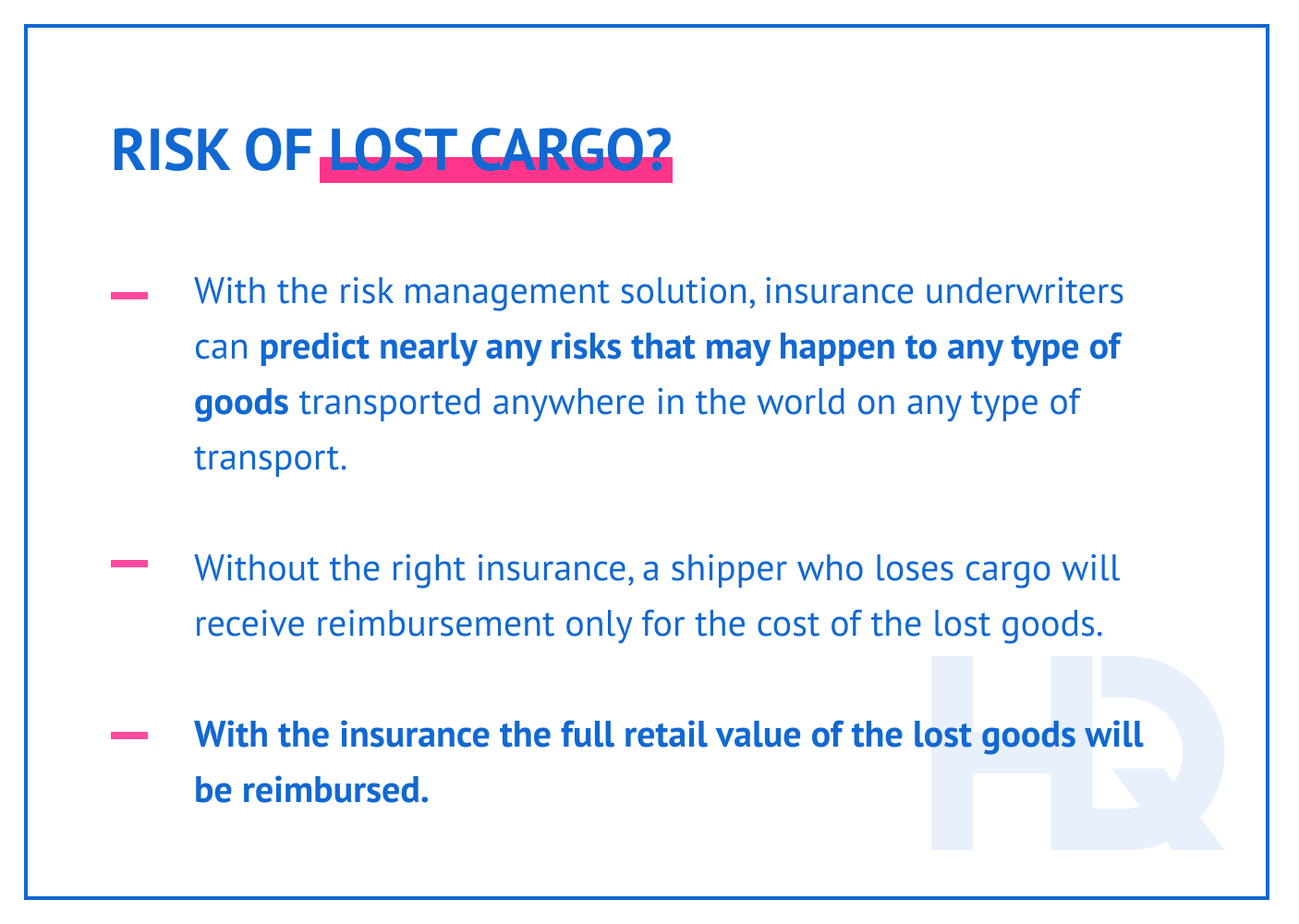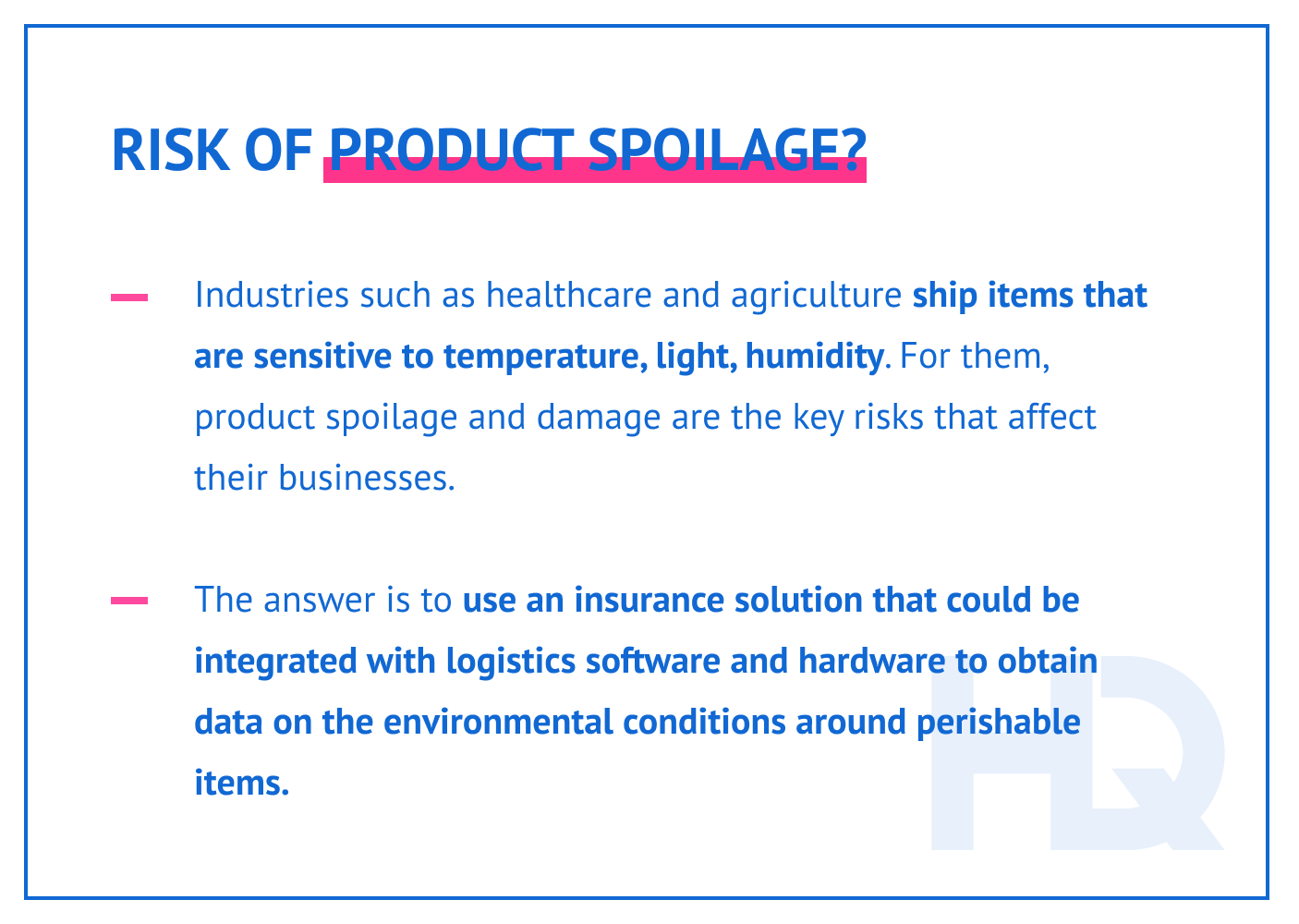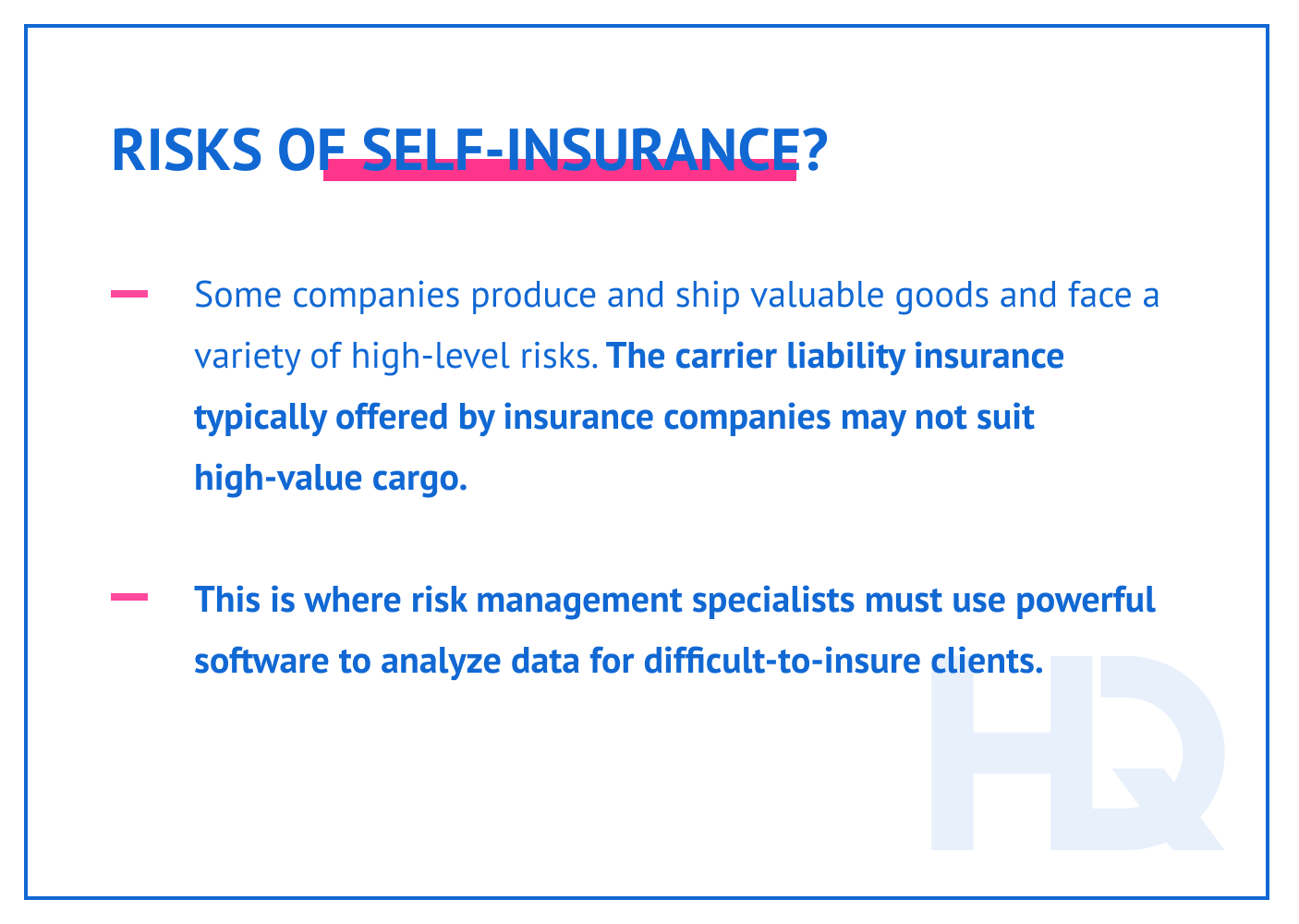In the course of doing business, logistics companies navigate various potential hazards and often face setbacks when seeking the most cost-effective ways to get items where they need to be at the right time.
Logistics keep the economy moving and need help to avoid a variety of pitfalls. This is what insurance does — protecting a logistics business for the long haul.
In this article, we will provide details on:
- What services insurance offer to logistics companies, depending on type
- What risks logistics companies face
- How insurance in logistics and insurance software solutions help mitigate those risks
Services insurers provide to logistics companies
The insurance industry offers a comprehensive set of coverages to logistics businesses designed to address their unique risks. Those risks differ from company to company depending on parameters such as the means of transport or the type of goods being shipped.
The majority of cases can be served by the standard coverage included in a logistics business insurance package.

Types of shipping routes in logistics.
Types of shipping routes
Logistics companies can choose from a variety of transport options, including:
- by land
- by air
- by sea or rivers
- multimodal routes
International logistics businesses tend to choose multimodal routes because they are typically cheaper or easier for covering the entire route. This is why most insurers offer multimodal insurance policies, which protect shippers against risks that may occur with transport or goods from the very beginning of the route to the final destination.
Insurance services also differ depending on what type of goods are shipped; this is the biggest determinant of what type of insurance coverage the business gets.
Types of logistics insurance coverage
Logistics companies serve a variety of customers and thus provide a variety of services, from shipping goods from a manufacturer to the point of sale by land, to shipping liquid fuels and dangerous fragile materials over long routes by land and sea, or even by air, or with multiple layovers.
This is the list of most popular insurance types, which suit the majority of customers:
Insurance software that works with logistics
We will develop a thought-out solution to mitigate risks just for your business. Let’s talk about it!
Anna Halias
Business Development Manager,
HQSoftware
Cargo insurance
Cargo insurance is the most popular type of coverage that protects shipments from physical damage or theft. This insurance ensures that the value of items is protected against damage occurring during transport. Cargo insurance is essential, because there is never a guarantee the cargo will not be damaged.
Freight Forwarder Liability insurance
Sometimes, even the best freight forwarder cannot predict and overcome all risks to the cargo. This is when this type of insurance comes into play. FFL insurance protects the freight forwarders themselves against accidental damage or loss to the cargo until it is safely delivered.
Marine services liability
This is legal liability coverage for various marine occupations, including ship repairers, transport terminal operators, and so on. This insurance includes protection from accidental damage, cargo insurance for inland transits, and so on.
Hull and machinery protection and indemnity
Hull and machinery insurance suits marine logistics businesses and covers loss or damage to a ship and its equipment. The insurance protects the structure of the vessel, equipment such as a pulley or crane, and equipment that generates power to move the vessel and control systems such as lighting and temperature.

Types of logistics insurance coverages.
Energy logistics
Energy logistics includes transport of renewable and nonrenewable energy, chemicals and petrochemicals, oil and gas upstream and downstream. This is a rather complex and demanding industry that requires special service. Top-quality materials, equipment, and dangerous fuels need to be transported with extra care and insured against various kinds of risks: important equipment not arriving on time, strict environmental and safety regulations not being met, and so on.
Dangerous goods and fuels logistics insurance
Companies that transport dangerous and flammable items work mostly with chemical fertilizers, cyanide, fuel, Security Sensitive Ammonium Nitrate, and oxidizing and corrosive substances. Transporting such goods is a serious responsibility, and if something happens to such goods the carrier is legally obligated to ensure everything is properly cleared and the area is safe. Thus, insurers provide a Transport Emergency Response plan to such customers so they know what to do in case of emergency.
Commercial vehicle insurance
There are two types of vehicle insurance: goods-carrying and passenger-carrying. This insurance is mandatory for all vehicles the logistics company uses for business purposes. The insurance covers all damage caused by or to the vehicle or the driver/owner.
Commercial general liability
A CGL insurance policy covers bodily and personal injury and damage to property that was caused by business operations or products. This is comprehensive business insurance that covers a wide range of risks, but may not cover rare risks. The insurance is either a claims-made policy or an occurrence policy; in the case of the second type, the event must take place during a set period to be covered.
Commercial property insurance
In addition to insuring vehicles and transported goods, logistics companies need to protect their office, business contents, equipment, and so on. Commercial property insurance covers risks such as fires, floods, vandalism, gas leaks, and other incidents that may ruin a business. This type of insurance may ensure that the business will be back up and running no matter what happens, and may provide not only insurance payouts but even cover the cost of setting up temporary offices.
There are so many risks to manage, and therefore many services insurers can provide to logistics companies. It’s no wonder that risk management is the key process insurance companies want to automate or at least digitalize.
Now let’s take a look at a list of typical risks logistics companies must deal with, and how insurers cover them.
Types of risks faced by logistics companies
Risks that haunt logistics companies are either very common and hard to avoid, or perhaps less common but potentially very damaging, including the loss of money, cargo, or worker health.

Most common risks for logistics.
The most сommon logistics company risks are:
- Cargo damage: physical damage during transport; the wrong temperature, humidity, or even light level can cause product spoilage
- Theft and hijacking: consignment stolen during transit
- Transportation delays: late delivery of goods
- Cargo loss: items lost during transit
- Business-sensitive data loss: data about logistics operations, business deals, transit details lost or stolen
- Regulatory breaches: customs problems, environmental pollution, safety-at-work issues
As you can see, managing risk in the logistics business isn’t easy. Players in this business must deal with constant risks while transporting various goods via air, land, and sea. Transported items may be destroyed, damaged, lost, or stolen. Dangerous goods can cause a fire.
External risks that companies must take into account include problems with international customs that are sometimes hard to avoid or control, or environmental pollution caused by damage to a container carrying hazardous cargo.
Insurance companies need to help logistics businesses mitigate these risks while saving money, and provide them with the most thoroughly well-thought-out coverage possible.
The key to success in insurance in logistics lies with the right software solution that helps to manage contracts, create coverage plans, prevent risks, and offer the best deal for both the insurance company and logistics businesses.
How insurance solutions help with logistics risk management
Risk management software for insurance is a highly specialized type of business software with complex functionality for risk analysis, treatment assessment, and opportunity analysis. Whether it is an out-of-the-box solution or a custom one, the needed functionality will differ.

Risk management in insurance solutions: software features.
But there are modules common to most risk management software which follow the typical workflow for such a solution:
- Threat assessment — the software evaluates the likelihood of a particular threatening event.
- Risk probability — the software evaluates the risks of such an event and its likelihood of occurring.
- Risk severity — the software evaluates how dangerous the risk is.
- Cost of risk — the software evaluates how much money the company will lose because of the risk.
- Analytics, reporting, dashboards — the software analyses all data related to the risk, creates reports on it and provides readable dashboards with all data.
With a robust risk management solution, insurance companies can help logistics businesses secure themselves against weaknesses and bolster confidence in the market, while saving money in their budgets.
Risk of lost cargo foreseen
Technology can help to “synchronize” insurance and logistics. Risk management specialists use specialized software to collect logistics data that provides the visibility needed to mitigate risks in the most vulnerable parts of the business. Using this data, insurance underwriters can predict nearly any risks that may happen to any type of goods transported anywhere in the world on any type of transport. What’s more, the same data helps insurance companies create coverage specific to various logistics businesses.
Let’s take a look at a situation involving marine logistics companies. Let’s say there is an emergency with the transport that means all cargo could be lost. A good cargo insurance policy protects the business and allows the captain of a ship to jettison some containers to protect the rest of the cargo.

How the risk of lost cargo is mitigated.
Without such insurance, a shipper who loses cargo will receive reimbursement only for the cost of the lost goods, leaving a huge hole in revenues. With the right insurance, the full retail value of the lost goods will be reimbursed.
With a well-thought-out insurance software solution, such risks can be foreseen and potential losses evaluated.
Risk of product spoilage prevented
Industries such as healthcare and agriculture ship items that are sensitive to temperature, light, and humidity. For them, product spoilage and damage are key risks affecting their businesses.
The objective of insurance risk management software is to foresee such problems and find ways to protect the products.
The answer is to use an insurance solution that is integrated with logistics software and hardware to obtain data on the environmental conditions around perishable items: temperature, humidity, container vibration, and more. The solution will also check whether the cargo is on track to arrive in time and, if there is a delay, what can be done to save the cargo.

How the risk of product spoilage is mitigated.
With related insurance coverage, the chosen mitigation tactics will be automatically turned on based on instructions predefined by the customer. The instructions may include procedures such as re-icing, changing to same-day delivery, or other solutions. The procedures are usually covered by insurance at no additional cost.
Risk of valuable cargo self-insurance
Some companies produce and ship valuable goods and face a whole lot of different types of risk exposure. The value of their products is very high, and every risk can cause a lot more damage. Let’s take jewelry producers as an example. Insurance companies offer carrier liability programs that often do not suit high-value cargo.
Such companies often have to mitigate risks on their own, but this decision requires having a large sum of money in reserve to reduce risks. This money might be better used differently, say for business development or R&D. That’s why such self-insuring is not efficient.

How the risk of self-insurance is mitigated.
This is where risk management specialists must use powerful software to analyze data for difficult-to-insure clients. Most insurance companies have little experience working with valuable goods, and to offer efficient insurance coverage the company must develop a whole new approach to such type of insurance. This is only possible after all data about the client’s risks are aggregated and analyzed.
To sum up
Logistics is a rather complicated industry for insurance because of the large variety of products the companies must transport, with the help of a variety of vehicles. The transported cargo may be flammable, fragile, dangerous to the environment; it may require special care during transportation, and so on.
The insurance industry tries to address all these issues with the help of predetermined coverages that suit most industries, but they do not take into account specific requirements. And the majority of insurers have never worked with demanding businesses (such as agriscience), so their strategy must involve obtaining and analyzing data about them.
We offer insurance software development services for the logistics industries with deep business analysis of a customer’s particular case and risks. This software is a full-fledged instrument that will answer all questions of risk management for insurance companies.

Founder
Hey! Welcome to our blog!
The topics we cover include IoT, AR/VR, related news, and our projects.If you’d
like to discuss an article, please
messsage
me on LinkedIn
Related Posts
View All
We are open to seeing your business needs and determining the best solution. Complete this form, and receive a free personalized proposal from your dedicated manager.

Sergei Vardomatski
Founder





